Đề thi chính thức THPT Quốc gia 2019 môn Tiếng Anh có đáp án
Đề thi Tiếng Anh THPT Quốc gia 2019 gồm 50 câu hỏi trong vòng 60 phút. Đề thi được xây dựng theo ma trận với 4 mức độ: nhận biết, thông hiểu, vận dụng và vận dụng cao. Dưới đây là đề thi chính thức và đáp án, mời các bạn đón xem:
Chỉ từ 200k mua trọn bộ đề thi THPT Quốc Gia Tiếng Anh năm 2023 theo ma trận đề minh họa bản word có lời giải chi tiết:
B1: Gửi phí vào tài khoản 0711000255837 - NGUYEN THANH TUYEN - Ngân hàng Vietcombank (QR)
B2: Nhắn tin tới zalo Vietjack Official - nhấn vào đây để thông báo và nhận giáo án.
Xem thử tài liệu tại đây: Link tài liệu
Đề thi chính thức THPT Quốc gia 2019 môn Tiếng Anh có đáp án
Đề thi môn Tiếng Anh THPT Quốc gia 2019 - Mã đề 401
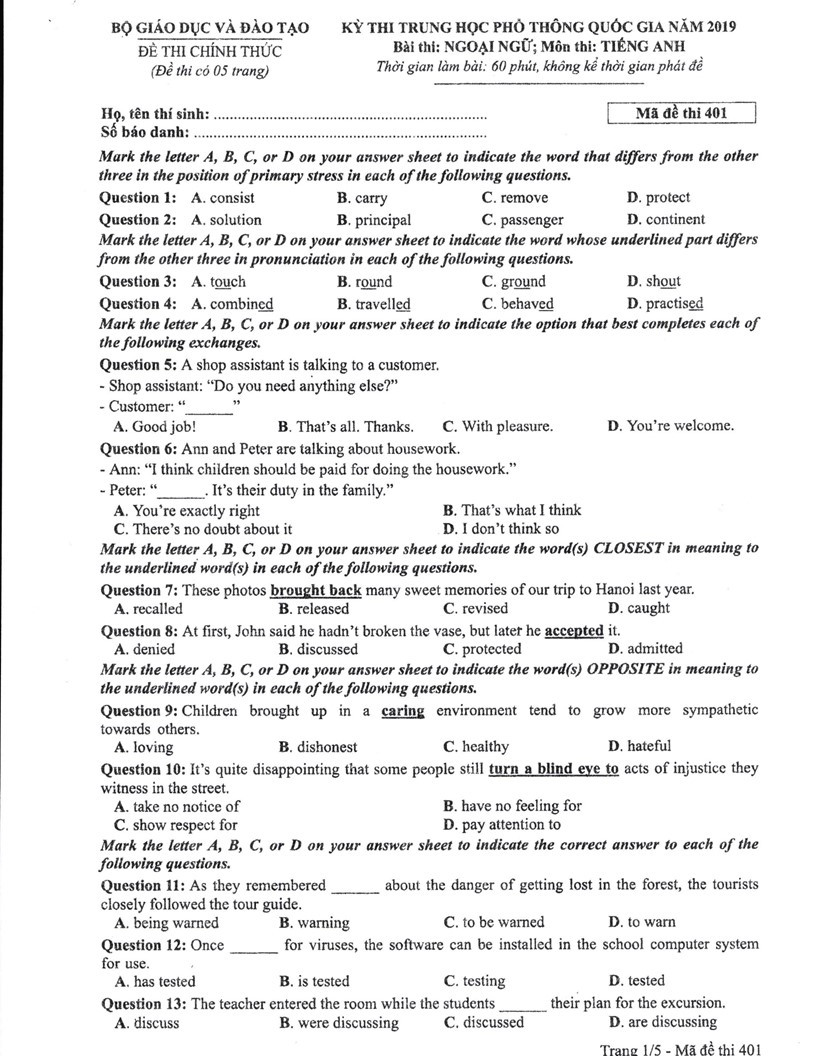
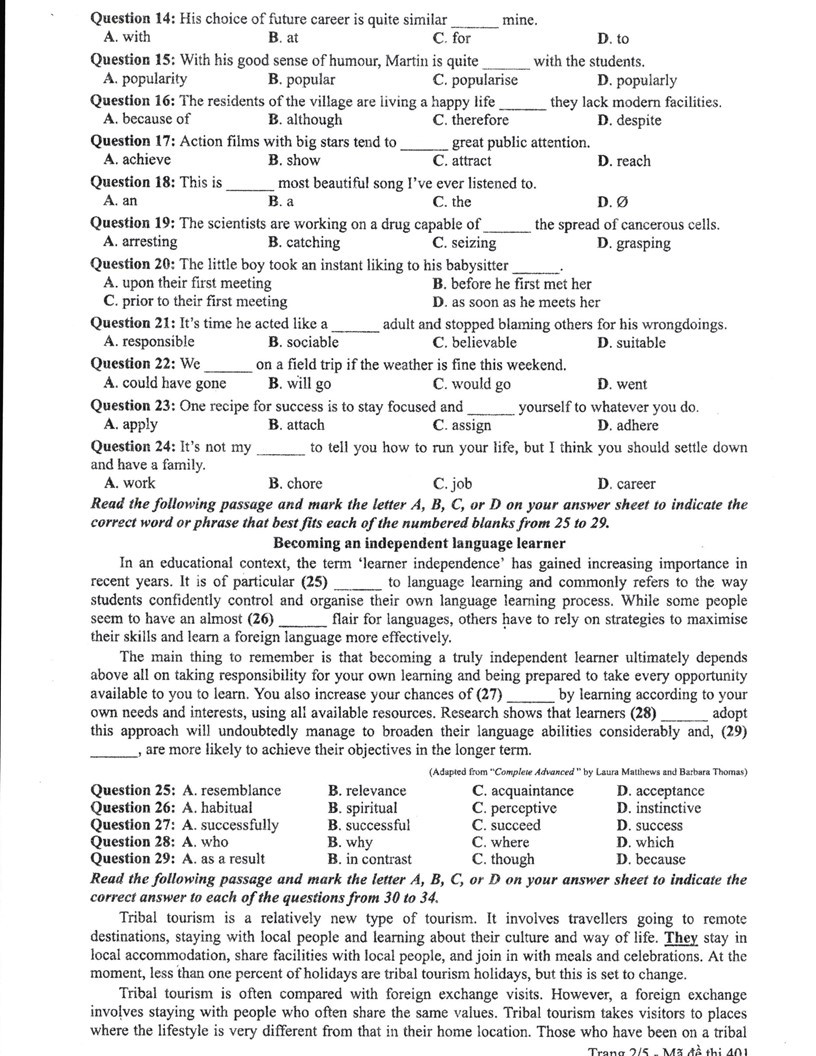
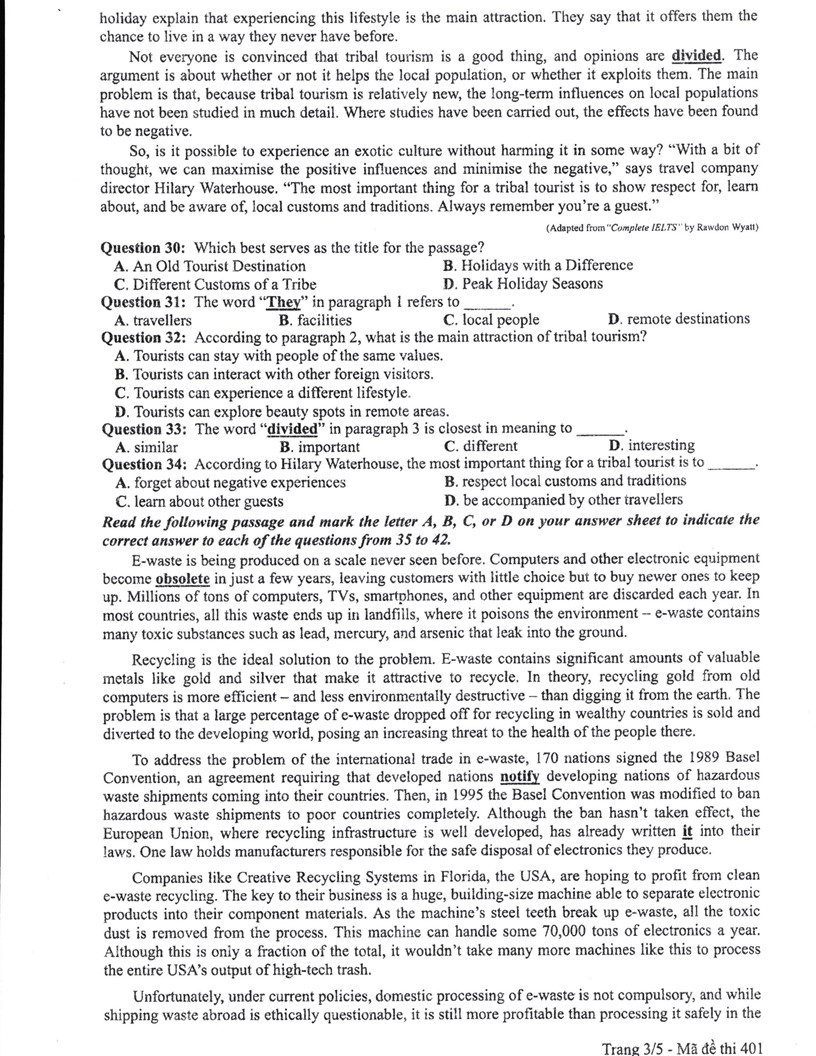
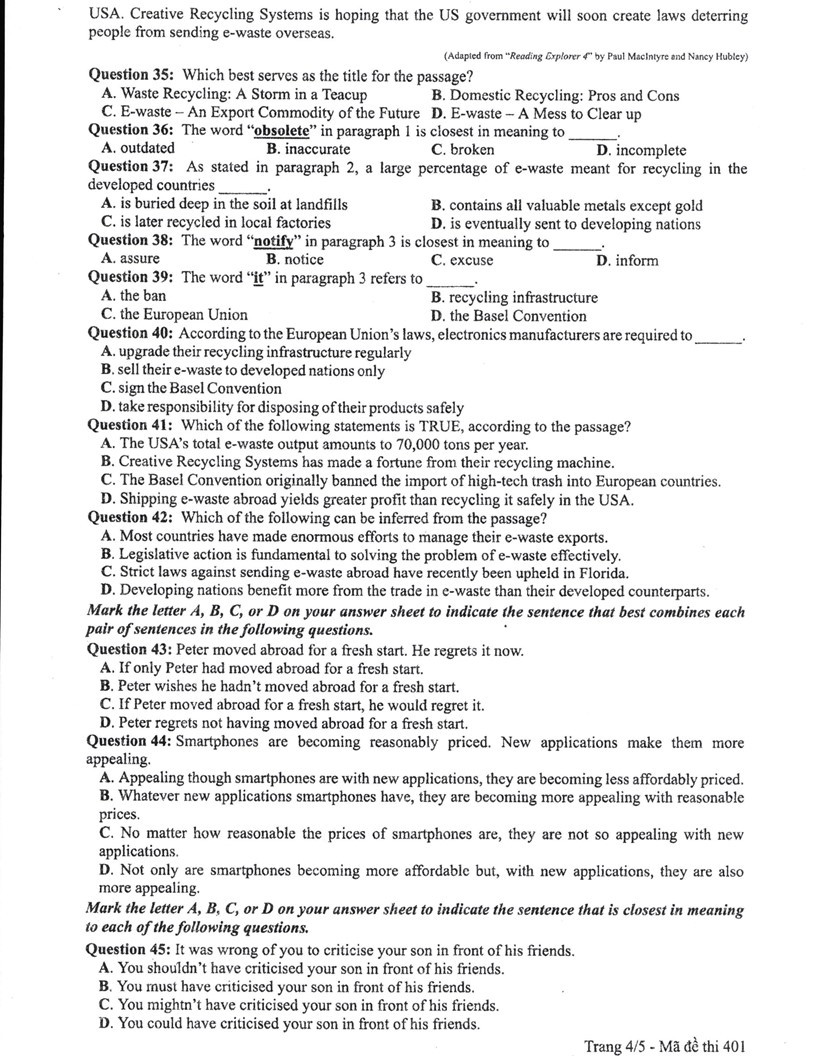
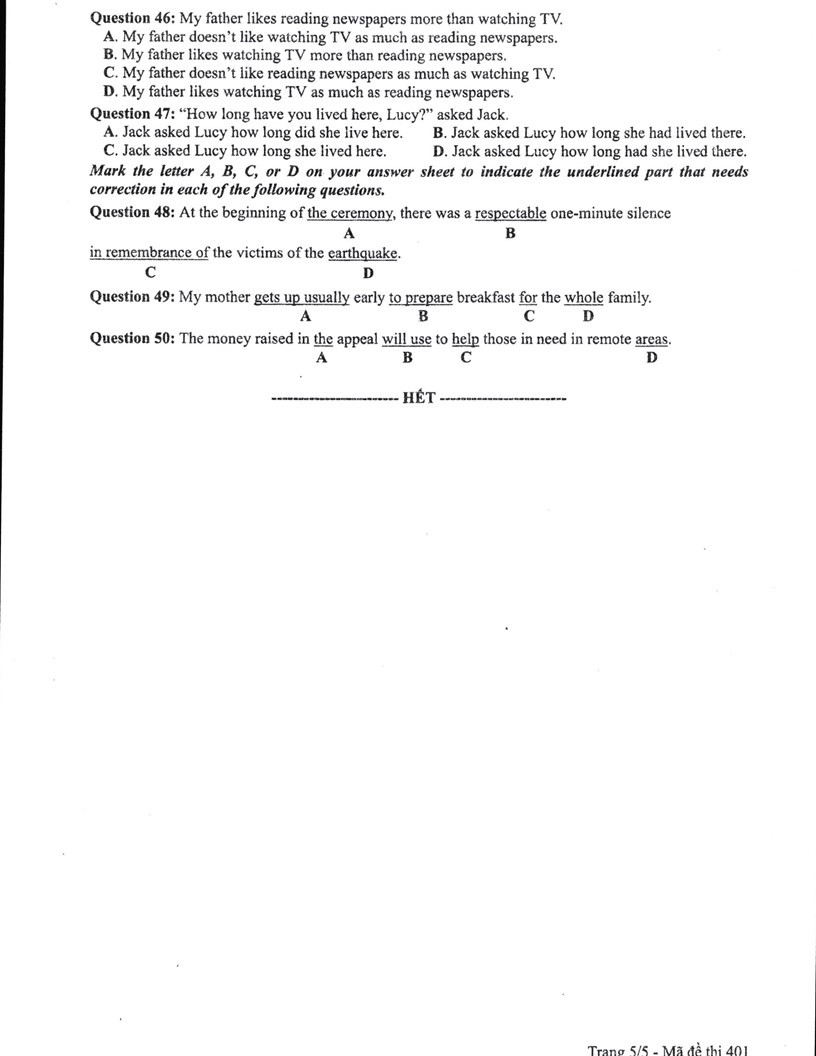 Đáp án Đề thi môn Tiếng Anh THPT Quốc gia 2019 - Mã đề 401
Đáp án Đề thi môn Tiếng Anh THPT Quốc gia 2019 - Mã đề 401
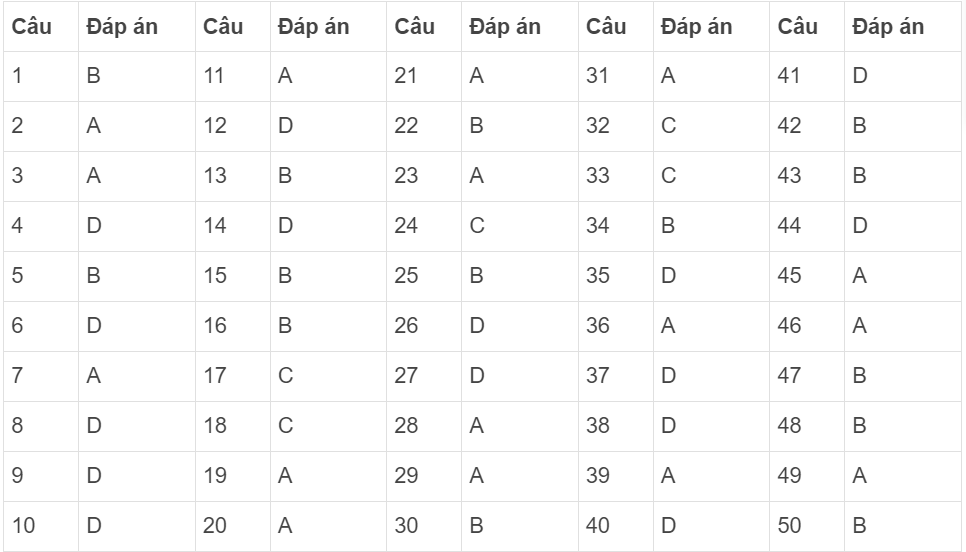
| Đáp án | Giải thích chi tiết | Phân loại |
| Mark the letter A, B, C, or D on your answer sheet to indicate the word that differs from the other three in the position of primary stress in each of the following questions. | ||
| 1. B |
A. consist /kənˈsɪst/ -> trọng âm nhấn vào âm số 2 B. carry /ˈkær.i/ -> trọng âm nhấn vào âm số 1 C. remove /rɪˈmuːv/ -> trọng âm nhấn vào âm số 2 D. protect /prəˈtekt/ -> trọng âm nhấn vào âm số 2 |
|
| 2. A |
A. solution /səˈluː.ʃən/ -> trọng âm nhấn vào âm số 2 B. principal /ˈprɪn.sə.pəl/ -> trọng âm nhấn vào âm số 1 C. passenger /ˈpæs.ən.dʒər/ -> trọng âm nhấn vào âm số 1 D. continent /ˈkɒn.tɪ.nənt/ -> trọng âm nhấn vào âm số 1 |
|
| Mark the letter A, B, C, or D on your answer sheet to indicate the word whose underlined part differs from the other three in pronunciation in each of the following questions | ||
| 3. A |
A. touch /tʌtʃ/ B. round /raʊnd/ C. ground /ɡraʊnd/ D. shout /ʃaʊt/ |
Kiến thức về phát âm tiếng Anh |
| 4. D |
A. combined /kəmˈbaɪnd/ B. travelled /ˈtræv.əld/ C. behaved /bɪˈheɪvd/ D. practised /ˈpræk.tɪst/ Để trả lời chính xác câu hỏi này, bạn cần phải nắm rõ quy tắc phát âm ed |
|
| Mark the letter A, B, C, or D on your answer sheet to indicate the option that best completes the following exchanges. | ||
| 5. B |
A shop assistant is talking to a customer. – Shop assistant: “Do you need anything else?” – Customer: “__________” A. Good job! B. That’s all. Thanks C. With pleasure. D. You’re welcome. Giải thích A sai, vì “Good job!” chỉ được dùng khi khen ai đó khi họ làm điều gì tốt, nhưng bạn nhân viên chỉ hỏi bạn có cần giúp gì thêm thôi. B. đúng, vì nó trả lời trực tiếp câu hỏi của bạn nhân viên: “bạn còn cần gì nữa không?” – “Tôi có đủ rồi. Cảm ơn nhé.” C và D sai, vì câu này chỉ hợp lý khi đáp lại lời cảm ơn. |
Bối cảnh xã hội |
| 6. D |
Ann and Peter are talking about housework. – Ann: “I think children should be paid for doing the housework ,” – Peter: “____________. It’s their duty in the family.” A. You’re exactly right C. There’s no doubt about it B. That’s what I think D. I don’t think so Giải thích Câu trả lời của Peter không đồng ý với Ann: “bọn trẻ nên được trả tiền để làm việc nhà >< đó là nghĩa vụ của chúng” => D đúng, trong khi các câu còn lại đều biểu hiện sự đồng ý. |
Bối cảnh xã hội |
| Mark the letter A, B, C, or D on your answer sheet to indicate the word(s) CLOSEST in meaning to the underlined word(s) in each of the following questions. | ||
| 7. A |
These photos brought back many sweet memories of our trip to Hanoi last year, A. recalled B. released C. revised D. caught Giải thích bring back memories: gợi nhớ lại (đem lại) những kỉ niệm. => A đúng, vì recalled cũng thường được dùng với memory với nghĩa “gợi nhớ”. C. sai vì revised là “ôn lại”, nhưng thường được dùng với tài liệu, nội dung hơn là với kỉ niệm. D. sai vì caught là “bắt lại”, không thường được dùng với “memories” |
Từ vựng |
| 8. D |
Question 8: At first, John said he hadn’t broken the vase, but later he accepted it. A. denied B. discussed C. protected D. admitted Giải thích accept (v): chấp nhận => John thừa nhận mình đã làm vỡ cái bình => D đúng. A sai vì denied (từ chối) ngược nghĩa hoàn toàn với Accepted B. sai vì đã có kết quả (he accepted it), họ không cần phải bàn (discuss) về nó nữa. C sai vì protected (bảo vệ) khác nghĩa với accepted |
Từ vựng |
| Mark the letter A, B, C, or D on your answer sheet to indicate the word(s) OPPOSITE in meaning to the underlined word(s) in each of the following questions. | ||
| 9. D |
Children brought up in a caring environment tend to grow more sympathetic towards others. A. loving B. dishonest C. healthy D. hateful Giải thích D đúng vi hateful (đầy căm ghét) trái ngược với caring (quan tâm) A và C sai vì loving (thương yêu) và healthy (lành mạnh) chúng mang nghĩa tích cực giống với caring. B.sai vì dù dishonest (không trung thực) có mang nghĩa tiêu cực đối lập với caring, nhưng chúng không đối nghĩa với nhau (dishonest >< honest). |
Từ vựng |
| 10. D |
It’s quite disappointing that some people still turn a blind eye to acts of injustice they witness in the street. A. take no notice of B. have no feeling for C. show respect for D. pay attention to Giải thích turn a blind eye to = ignore (v): nhắm mắt làm ngơ, lờ đi, không đếm xỉa đến. D đúng vì pay attention to là chú ý đến điều gì đó, ngược lại với lờ đi. A sai vì take no notice of (không chú ý đến cái gì) đồng nghĩa với từ trong đề bài. B. sai, vì have no feeling for (không có cảm giác với cái gì) nên không có liên quan nhiều về mặt nghĩa với cụm từ trong câu hỏi. C sai vì dù show respect for (thể hiện sự tôn trọng đối với ai đó) mang tính tích cực đối lập với từ được cho, nhưng chúng không quá liên quan về nghĩa. |
Từ vựng |
| Mark the letter A, B, C, or D on your answer sheet to indicate the correct answer to each of the following questions. | ||
| 11. A |
As they remembered ________ about the danger of getting lost in the forest, the tourists closely followed the tour guide. A. being warned B. warning C. to be wanted D. to warn Giải thích Để trả lời câu hỏi này, các bạn cần nắm được 2 cấu trúc:
Dịch câu hỏi: Vì họ nhớ _______ về nguy cơ lạc trong rừng, nên những du khách này theo sát người hướng dẫn viên du lịch. Dựa vào ngữ cảnh trên, ta thấy đáp án A: being warned (được cảnh báo) là phù hợp nhất. Remember being warned: nhớ là đã được cảnh báo |
Câu bị động |
| 12. D |
Once _________ for viruses, the software can be installed in the school computer system for use. A. has tested B. is tested C. testing D. tested Giải thích Với câu hỏi này, các bạn cần nắm được kiến thức về cách rút gọn mệnh đề trạng ngữ, và câu bị động. Câu hỏi nếu được viết đầy đủ thì sẽ như sau: Once the software is tested for viruses, the software can be installed in the school computer system for use. (Sau khi phần mềm được kiểm tra vi-rút, phần mềm có thể được cài đặt trong hệ thống máy tính của trường để sử dụng.) Trong trường hợp này, ta có thể rút gọn mệnh đề trạng ngữ nhằm tránh việc lặp từ “software”. Once + Vpii, clause. Vì vậy, câu hỏi lúc này trở thành: Once tested for viruses, the software can be installed in the school computer system for use |
Rút gọn mệnh đề trạng ngữ |
| 13. B |
The teacher entered the room while the students __________ their plan for the excursion. A. discuss B. were discussing C. discussed D. are discussing Giải thích Câu này mang cấu trúc đặc trưng của thì Quá khứ Tiếp diễn, về thời điểm xác định cô giáo đi vào phòng (Quá khứ) thì học sinh đang bàn luận (đang diễn ra tại thời điểm đó): S1 + V-ed + O, while S2 + was/were V-ing + O Chú ý: một trong những cách sử dụng của thì quá khứ tiếp diễn là: Diễn tả hai hành động đang xảy ra song song, đồng thời. => B. đúng |
Quá khứ Tiếp diễn |
| 14. D |
Question 14: His choice of future career is quite similar _________ mine. A. with B. at C. for D. to Giải thích Ta có cụm từ be similar to: giống với cái gì đó => D đúng |
Phrasal verb (Từ vựng) |
| 15. B |
Question 15: With his good sense of humour, Martin is quite _________ with the students. A. popularity B. popular C. popularise D. popularly Giải thích Để có thể trả lời câu hỏi này, các bạn cần nắm được một cụm từ liên quan đến “popular”. tobe popular with somebody: ai đó được ưa chuộng, yêu mến bởi ai. |
Từ vựng |
| 16. B |
The residents of the village are living a happy life _________ they lack modern facilities A. because of B. although C. therefore D. despite Giải thích Xét về nghĩa của 2 vế: Vế 1: Người dân trong làng đang sống một cuộc sống hạnh phúc Vế 2: Họ thiếu cơ sở vật chất hiện đại. Hai vế có mang tính đối lập: “hạnh phúc” và “thiếu thốn” => B. đúng, vì although mang nghĩa là mặc dù: mặc dù có thiếu thốn thì họ vẫn hạnh phúc. A và C sai, vì chúng mang tính chất nguyên nhân kết quả. D sai vì sau Despite phải là Danh từ hoặc Cụm danh từ, và Vế 2 là một Mệnh đề
|
Liên từ |
| 17. C |
Action films with big stars tend to _________ great public attention. A. achieve B. show C. attract D. reach Giải thích Để trả lời câu hỏi này, các bạn cần nắm rõ một số Collocation phổ biến trong tiếng Anh. Cụ thể: Attract one’s attention: thu hút sự chú ý của ai đó => C đúng, vì những bộ phim lớn thường thu hút sự chú ý của công chúng (public attention) |
Collocation (từ vựng) |
| 18. C |
This is ________ most beautiful song I’ve ever listened to. A. an B. a C. the D. Ø Giải thích Với câu hỏi này, các bạn cần nắm rõ kiến thức liên quan đến ngữ pháp so sánh nhất:
Câu có sử dụng phép So sánh nhất với Tính từ dài: the most + Adj => C đúng |
Mạo từ So sánh nhất với Tính từ dài |
| 19. D |
The scientists are working on a drug capable of __________ the spread of cancerous cells. A. arresting B. catching C. seizing D. grasping Giải thích Tất cả những từ này đều có nét nghĩa là “bắt, nắm giữ được thứ gì đó” nhưng đồng thời chúng cũng có những điểm khác biệt: Yêu cầu đề bài: tác dụng của một loại thuốc: có thể dừng lại sự lan tỏa của tế bào ung thư.
=> A đúng |
Từ vựng |
| 20. A |
The little boy took an instant liking to his babysitter __________. A. upon their first meeting B. before he first met her C. prior to their first meeting D. as soon as he meets her Giải thích Xét vè nghĩa: Cậu bé này thích người trông trẻ ngay lập tức => cậu bé thích anh/cô ấy ngay sau khi họ gặp nhau. => B, C sai vì “before” và “prior” đều mang ý là “trước” => sai => D sai vì “as soon as” mang tính giả định: đến khi nào cẩu gặp anh/cô ấy => chưa gặp => sai => A đúng, vì upon là “trong” => họ đã gặp trong cuộc gặp mặt. |
|
| 21. A |
It’s time he acted like a _________ adult and stopped blaming others for his wrongdoings A. responsible (adj): có trách nhiệm Giải thích stopped blaming others for his wrongdoings – ngừng đổ lỗi sai của mình cho người khác. Dựa vào ngữ cảnh của câu, ta cần một tính từ mang nghĩa “có trách nhiệm/biết chịu trách nhiệm”. Do đó đáp án A. responsible là đáp án chính xác |
Từ vựng |
| 22. B |
We __________ on a field trip if the weather is fine this weekend. A. could have gone B. will go C. would go D. went Giải thích Câu dùng cấu trúc câu điều kiện loại 1 với dấu hiệu động từ “is” của mệnh đề If được chia ở thì hiện tại đơn, nên động từ ở mệnh đề chính phải được chia ở thì tương lai đơn. Cấu trúc cần nhớ: => B. đúng |
Câu điều kiện loại 1 |
| 23. D |
One recipe for success is to stay focused and _________ yourself to whatever you do. A. apply B. attach C. assign D. adhere Giải thích Để trả lời câu hỏi này, các bạn cần nắm được một số collocations phổ biến trong tiếng Anh Vị trí chỗ trống của câu trên cần một động từ kết hợp cùng cụm “yourself to whatever you do”. Đồng thời, ta thường dùng cụm động từ “apply oneself to something/on doing something” để miêu tả ý “cố gắng hết sức”. => A đúng. Dưới đây là một số collocation với các đáp án còn lại:
|
Collocation (Từ vựng) |
| 24. C |
It’s not my ________ to tell you how to run your life, but I think you should settle down and have a family. A. work B. chore C. job D. career Câu trên đang muốn diễn tả ý “Không phải việc của tôi…” với từ “việc” mang ý trừu tượng nên ta có thể dùng danh từ “job” hoặc “business”. => C đúng [Xem thêm]: Phân biệt job, task, career và work |
Từ vựng |
| Read the following passage and mark the letter A, B, C, or D on your answer sheet to indicate the correct word or phrase that best fits each of the numbered blanks from 25 to 29. | ||
|
Becoming an independent language learner In an educational context, the term ‘learner independence’ has gained increasing importance in recent years. It is of particular (25) __________ to language learning and commonly refers to the way students confidently control and organise their own language learning process. While some people seem to have an almost (26) __________ flair for languages, others have to rely on strategies to maximise their skills and leam a foreign language more effectively. The main thing to remember is that becoming a truly independent learner ultimately depends above all on taking responsibility for your own learning and being prepared to take every opportunity available to you to learn. You also increase your chances of (27) ___________ by learning according to your own needs and interests, using all available resources. Research shows that learners (28) ___________ adopt this approach will undoubtedly manage to broaden their language abilities considerably and, (29) ___________, are more likely to achieve their objectives in the longer term. (Adapted from “Complete Advanced” by Laura Mathews and Barbara Thomas) |
||
| 25. B |
In an educational context, the term ‘learner independence’ has gained increasing importance in recent years. It is of particular (25) __________ to language learning and commonly refers to the way students confidently control and organise their own language learning process. A. resemblance (between/ to): sự giống nhau = similarity to B. acceptance: sự chấp nhận C. relevance (of/ to): liên quan đến D. acquaintance: người quen Giải thích Tạm dịch: Trong bối cảnh giáo dục, thuật ngữ độc lập người học đã đạt được tầm quan trọng ngày càng tăng trong những năm gần đây. Nó liên quan đặc biệt đến việc học ngôn ngữ và thường đề cập đến cách thức. |
Từ vựng |
| 26. D |
While some people seem to have an almost (26) _________ flair for languages, others have to rely on strategies to maximise their skills and learn a foreign language more effectively. A. habitual (adj): thói quen B. spiritual (adj): tinh thần C. perceptive (adj): nhận thức D. instinctive (adj): bản năng Giải thích Trong bài nói về những người học ngôn ngữ giỏi bẩm sinh so với những người cần sử dụng các chiến lược để cải thiện kỹ năng học ngôn ngữ của họ. Từ “instinctive ” có nghĩa là một cái gì đó đến một cách tự nhiên, không cần suy nghĩ hay nỗ lực có ý thức. Do đó, “instinctive” là từ thích hợp nhất để sử dụng trong ngữ cảnh này vì nó phản ánh ý tưởng về khả năng học ngôn ngữ tự nhiên. |
Từ vựng |
| 27. D | You also increase your chances of (27) ___________ by learning according to your own needs and interests, using all available resources. A. successfully B. successful C. succeed D. success Giải thích |
Loại từ |
| 28. A | Research shows that learners (28) ___________ adopt this approach will undoubtedly manage to broaden their language abilities considerably and, (29) ___________, are more likely to achieve their objectives in the longer term. A. who B. why C. where D. which Giải thích |
Mệnh đề quan hệ |
| 29. A | Research shows that learners (28) ___________ adopt this approach will undoubtedly manage to broaden their language abilities considerably and, (29) ___________, are more likely to achieve their objectives in the longer term. A. as a result B. in contrast C. though D. because Giải thích |
Liên từ |
| Read the following passage and mark the letter A, B, C, or D on your answer sheet to indicate the correct answer to each of the questions from 31 to 35. | ||
|
Tribal tourism is a relatively new type of tourism. It involves travellers going to remote destinations, staying with local people and learning about their culture and way of life. They stay in local accommodation, share facilities with local people, and join in with meals and celebrations. At the moment, less than one percent of holidays are tribal tourism holidays, but this is set to change. Tribal tourism is often compared with foreign exchange visits. However, a foreign exchange involves staying with people who often share the same values. Tribal tourism takes visitors to places where the lifestyle is very different from that in their home location. Those who have been on a tribal holiday explain that experiencing this lifestyle is the main attraction. They say that it offers them the chance to live in a way they never have before. So, is it possible to experience an exotic culture without harming it in some way? “With a bit of thought, we can maximise the positive influences and minimise the negative,” says travel company director Hilary Waterhouse. “The most important thing for a tribal tourist is to show respect for, learn about, and be aware of, local customs and traditions. Always remember you’re a guest. |
||
| 30. B |
Which best serves as the title for the passage? A. An Old Tourist Destination B. Holidays with a Difference C. Different Customs of a Tribe D. Peak Holiday Seasons Giải thích A sai, vì ngay câu đầu: “Tribal tourism is a relatively new type of tourism.” => du lịch bộ lạc không thể cũ được. C sai, vì phần lớn cả bài đều nói về dịch vụ du lịch của bộ lạc, nội dung của đoạn 3 và 4 hoàn toàn không nói gì đến phong tục cụ thể của bộ lạc. D sai, vì trong bài không nhắc đến đỉnh điểm mùa du lịch. |
Main idea |
| 31. A | The word “they” in paragraph 1 refers to A. travellers B. facilities C. local people D. remote destinations A đúng, vì chỉ có khách du lịch mới có thể trải nghiệm và ở với người địa phương và tham gia (join in) vào các bữa ăn và tiệc của họ. |
Câu hỏi suy luận |
| 32. C | According to paragraph 2, what is the main attraction of tribal tourism? A. Tourists can stay with people of the same values. B. Tourists can interact with other foreign visitors. C. Tourists can experience a different lifestyle. D. Tourists can explore beauty spots in remote areas. |
Câu hỏi thông tin chi tiết |
| 33. C |
The word “divided” in paragraph 3 is closest in meaning to _________. A. similar: tương tự B. important: quan trọng C. different: khác biệt D. interesting: thú vị Giải thích divided (adj): tách biệt. => divided opinion (n): ý kiến trái chiều. => C đúng |
Từ vựng |
| 34. B |
According to Hilary Waterhouse, the most important thing for a tribal tourist is to ______. A. forget about negative experiences B. respect local customs and traditions C. learn about other guests D, be accompanied by other travellers Giải thích A. quên đi những trải nghiệm tiêu cực B. tôn trọng phong tục tập quán địa phương C. tìm hiểu về những vị khách khác D. đi cùng với những du khách khác => B. đúng |
Câu hỏi thông tin chi tiết |
| Read the following passage and mark the letter A, B, C, or D on your answer sheet to indicate the correct answer to each of the questions from 35 to 42 | ||
|
E-waste is being produced on a scale never seen before. Computers and other electronic equipment become obsolete in just a few years, leaving customers with little choice but to buy newer ones to keep up. Millions of tons of computers, TVs, smartphones, and other equipment are discarded each year. In most countries, all this waste ends up in landfills, where it poisons the environment- e-waste contains many toxic substances such as lead, mercury, and arsenic that leak into the ground. Recycling is the ideal solution to the problem. E-waste contains significant amounts of valuable metals like gold and silver that make it attractive to recycle. In theory, recycling gold from old computers is more efficient- and less environmentally destructive than digging it from the earth. The problem is that a large percentage of e-waste dropped off for recycling in wealthy countries is sold and diverted to the developing world, posing an increasing threat to the health of the people there. To address the problem of the international trade in e-waste, 170 nations signed the 1989 Basel Convention, an agreement requiring that developed nations notify developing nations of hazardous waste shipments coming into their countries. Then, in 1995 the Basel Convention was modified to ban hazardous waste shipments to poor countries completely. Although the ban hasn’t taken effect, the European Union, where recycling infrastructure is well developed, has already written it into their laws. One law holds manufacturers responsible for the safe disposal of electronics they produce. Companies like Creative Recycling Systems in Florida, the USA, are hoping to profit from clean e-waste recycling. The key to their business is a huge, building-size machine able to separate electronic products into their component materials. As the machine’s steel teeth break up e-waste, all the toxic dust is removed from the process. This machine can handle some 70,000 tons of electronics a year. Although this is only a fraction of the total, it wouldn’t take many more machines like this to process the entire USA’s output of high-tech trash. Unfortunately, under current policies, domestic processing of e-waste is not compulsory, and while shipping waste abroad is ethically questionable, it is still more profitable than processing it safely in the USA. Creative Recycling Systems is hoping that the US government will soon create laws deterring people from sending e-waste overseas. |
||
| 35. D |
Which best serves as the title for the passage? A. Waste Recycling: A Storm in a Teacup B. Domestic Recycling: Pros and Cons C. E-waste- An Export Commodity of the Future D. E-waste- A Mess to Clear up Giải thích |
Hỏi về tiêu đề |
| 36. A |
The word “obsolete” in paragraph 1 is closest in meaning to ________. A. outdated: lỗi thời B. inaccurate: không chính xác C. broken: hỏng hóc D. incomplete: không hoàn thiện Giải thích obsolete (adj): lỗi thời; quá hạn => A đúng |
Từ vựng |
| 37. D |
As stated in paragraph 2, a large percentage of e-waste meant for recycling in the developed countries ________. A. is buried deep in the soil at landfills B. contains all valuable metals except gold C. is later recycled in local factories D. is eventually sent to developing nations Giải thích Đoạn trong bài: “The problem is that a large percentage of e-waste dropped off for recycling in wealthy countries is sold and diverted to the developing world, posing an increasing threat to the health of the people there.” => D đúng |
Câu hỏi thông tin chi tiết |
| 38. D |
The word “notify” in paragraph 3 is closest in meaning to ________. A. assure: đảm bảo B. notice: chú ý C. excuse: xin lỗi D. inform: thông báo notify: thông báo => D đúng |
Từ vựng |
| 39. A |
The word “it” in paragraph 3 refers to ________. A. the ban B. recycling infrastructure C. the European Union D. the Basel Convention Giải thích Trong bài: “Although the ban hasn’t taken effect, the European Union, where recycling infrastructure is well developed, has already written it into their laws.” “it” đã được “ký thành” (written into) luật => it sẽ phải là một thứ có thể “ký thành” văn bản được => A đúng |
Câu hỏi suy luận |
| 40. D |
According to the European Union’s laws, electronics manufacturers are required to ________. A. upgrade their recycling infrastructure regularly B. sell their e-waste to developed nations only C. sign the Basel Convention D. take responsibility for disposing of their products safely Giải thích Trong bài: “One law holds manufacturers responsible for the safe disposal of electronics they produce.” => D đúng |
Câu hỏi suy luận |
| 41. D |
Which of the following statements is TRUE, according to the passage? A. The USA’s total e-waste output amounts to 70,000 tons per year. B. Creative Recycling Systems has made a fortune from their recycling machine. C. The Basel Convention originally banned the import of high-tech trash into European countries. D. Shipping e-waste abroad yields greater profit than recycling it safely in the USA. Giải thích Trong bài: “Unfortunately, under current policies, domestic processing of e-waste is not compulsory, and while shipping waste abroad is ethically questionable, it is still more profitable than processing it safely in the USA.” => D đúng |
Câu hỏi True/ Not True |
| 42.B |
Which of the following can be inferred from the passage? A. Most countries have made enormous efforts to manage their e-waste exports. B. Legislative action is fundamental to solving the problem of e-waste effectively. C. Strict laws against sending e-waste abroad have recently been upheld in Florida. D. Developing nations benefit more from the trade in e-waste than their developed counterparts. Giải thích Trong bài: “Creative Recycling Systems is hoping that the US government will soon create laws deterring people from sending e-waste overseas.” => B. đúng |
|
| Mark (he letter A, B, C, or D on your answer sheet to indicate the sentence that best combines each pair of sentences in the following questions. | ||
| 43. B |
Peter moved abroad for a fresh start. He regrets it now. A. If only Peter had moved abroad for a fresh start. B. Peter wishes he hadn’t moved abroad for a fresh start. C. If Peter moved abroad for a fresh start, he would regret it. D. Peter regrets not having moved abroad for a fresh start , Dịch đề bài: Peter chuyển ra nước ngoài cho một khởi đầu mới. Bây giờ anh ấy đang hối hận. A. Peter ước anh ấy đã không chuyển ra nước ngoài cho một khởi đầu mới. (Đúng nghĩa, đúng cấu trúc) B. Nếu Peter chuyển ra nước ngoài cho một khởi đầu mới, anh ấy sẽ hối hận. (Sai nghĩa) C. Peter hối tiếc vì đã không chuyển ra nước ngoài cho một khởi đầu mới. (Sai nghĩa – sự thật là đã chuyển ra nước ngoài) D. Giá như Peter đã chuyển ra nước ngoài cho một khởi đầu mới. (Sai nghĩa – như C) |
|
| 44. D |
Smartphones are becoming reasonably priced. New applications make them more appealing. A. Appealing though smartphones are with new applications, they are becoming less affordably priced. B. Whatever new applications smartphones have, they are becoming more appealing with reasonable prices. C. No matter how reasonable the prices of smartphones are, they are not so appealing with new applications. D. Not only are smartphones becoming more affordable but, with new applications, they are also more appealing. Giải thích Tạm dịch: Điện thoại thông minh đang ngày càng có giá hợp lý hơn. Các ứng dụng mới làm cho chúng hấp dẫn hơn. *Xét các đáp án: A. Bất kể điện thoại thông minh có tính năng mới nào, chúng đều trở nên hấp dẫn hơn với giá cả hợp lý. => Sai về ngữ nghĩa. B. Dù giá của điện thoại thông minh hợp lý thế nào, chúng không quá hấp dẫn với các tính năng mới. => Sai về ngữ nghĩa. C. Mặc dù điện thoại thông minh có các tính năng mới hấp dẫn hơn, nhưng chúng đang trở nên có giá thấp hơn. => Sai về ngữ nghĩa. D. Đúng về cả câu trả lời và ngữ nghĩa. (Điện thoại thông minh không chỉ có giá phải chăng mà chúng còn hấp dẫn hơn với các tính năng mới.) |
Cấu trúc Not only – But also |
| Mark the letter A, B, C, or D on your answer sheet to indicate the sentence that is closest in meaning to each of the following questions. | ||
| 45. A |
It was wrong of you to criticise your son in front of his friends. A. You shouldn’t have criticised your son in front of his friends. B. You must have criticised your son in front of his friends. C. You mightn’t have criticised your son in front of his friends. D. You could have criticised your son in front of his friends. Giải thích
Tạm dịch: Thật sai lầm khi ông chỉ trích con trai trước mặt bạn bè của nó.
=> A đúng |
Câu so sánh |
| 46. A |
My father likes reading newspapers more than watching TV. A. My father doesn’t like watching TV as much as reading newspapers. B. My father likes watching TV more than reading newspapers. C. My father doesn’t like reading newspapers as much as watching TV. D. My father likes watching TV as much as reading newspapers. Giải thích Kiến thức: Câu trúc so sánh hơn: S + V + O1 + so sánh hơn của trạng từ + THAN + O2 Câu trúc so sánh bằng: S + V + O1 + as + adv + as + O2 Tạm dịch: Bố tôi thích đọc báo hơn là xem TV. A. Bố tôi không thích xem TV như đọc báo. B. Bố tôi thích xem TV hơn đọc báo. C. Bố tôi không thích đọc báo như xem TV. D. Bố tôi thích xem TV như đọc báo. Các đáp án B, C, D sai về nghĩa. => A đúng |
Cấu trúc so sánh |
| 47. B |
“How long have you lived here, Lucy?’’ asked Jack. A. Jack asked Lucy how long did she live here. B. Jack asked Lucy how long she had lived there. C. Jack asked Lucy how long she lived here D. Jack asked Lucy how long had she lived there Giải thích Kiến thức: Trong câu gián tiếp, khi động từ tường thuật ở thì quá khứ đơn (asked), ta thực hiện các chuyển đổi: S + asked + O + wh – word + S + V (lùi thì) – have lived => had lived – you => she – here => there Tạm dịch: “Bạn đã sống ở đây bao lâu rồi Lucy?” – Jack hỏi. => Jack hỏi Lucy cô ấy đã sống ở đây được bao lâu rồi. => B. đúng |
Thì quá khứ đơn |
| Mark the letter A, B, C, or D on your answer sheet to indicate the underlined part that needs correction in each of the following questions. | ||
| 48. B |
At the beginning of the ceremony, there was a respectable A B one-minute silence in remembrance of the victims of the C earthquake. D Giải thích B. sai, vì: respectable (adj): đáng kính, dùng để miêu tả người => không hợp lý => sửa lại thành respectful (adj): bày tỏ sự kính trọng |
Từ vựng |
| 49. A |
My mother gets up usually early to prepare breakfast for A B C the whole family. C Giải thích A sai, vì trạng từ chỉ tần suất luôn đứng sau động từ thường => sửa lại thành usually gets up |
Trạng từ |
| 50. B |
The money raised in the appeal will use to help those in A B C need in remote areas. D B. sai, vì xét theo nghĩa thì ta cần chia Động từ use ở dạng bị động (số tiền đã được quyên góp sẽ được dùng…) => sửa lại thành will be used. |
Thể bị động |
Đề thi môn Tiếng Anh THPT Quốc gia 2019 - Mã đề 402
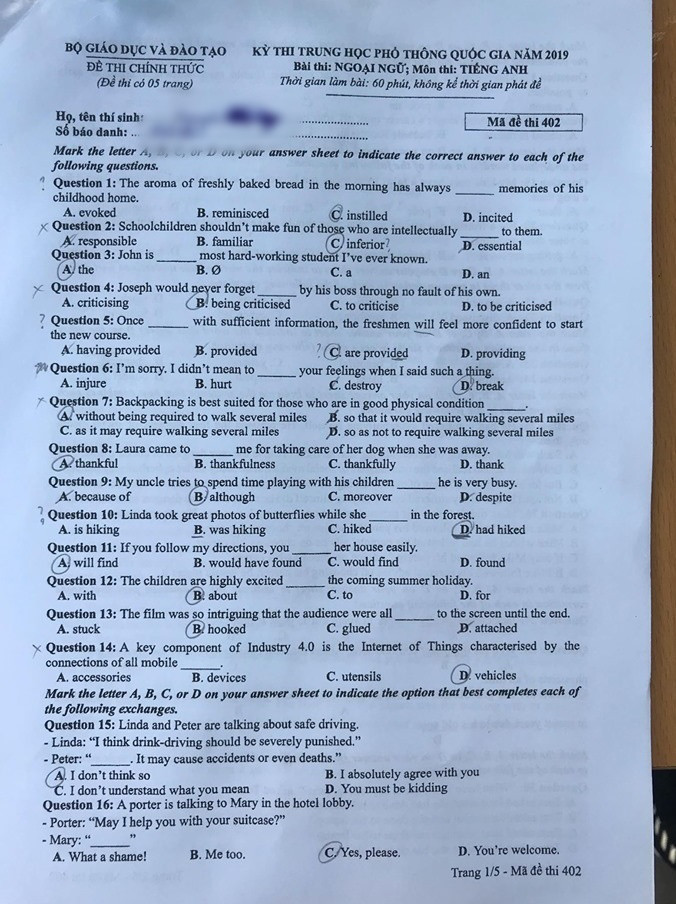
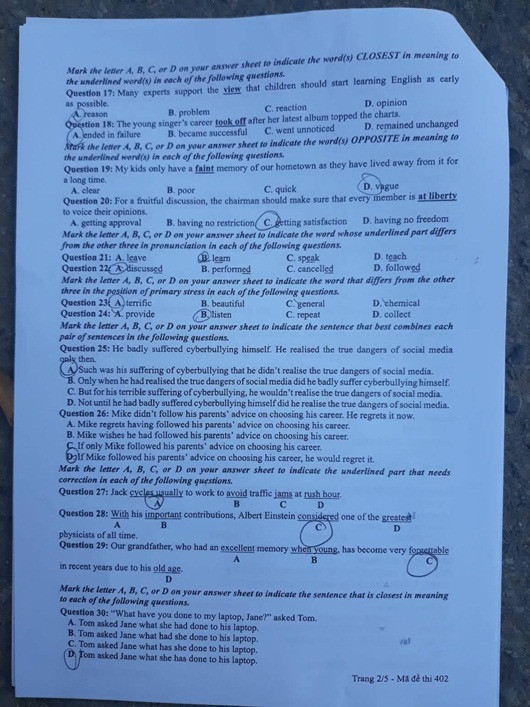
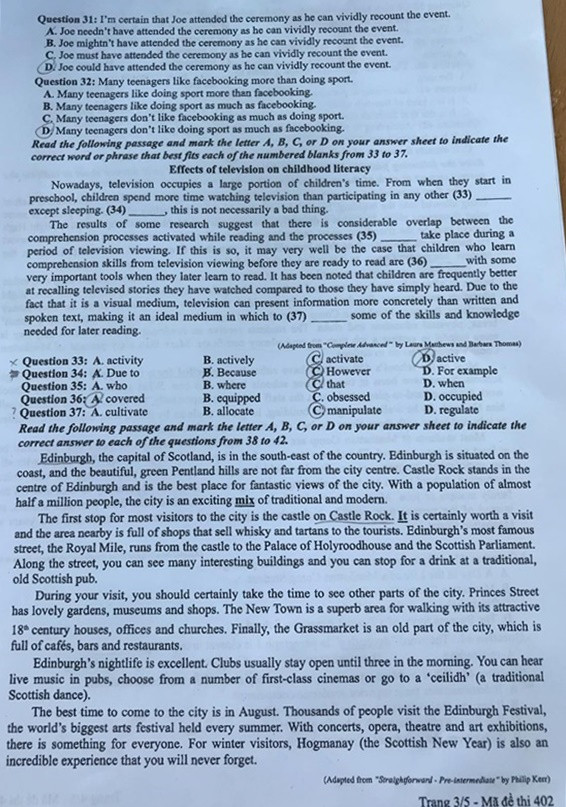
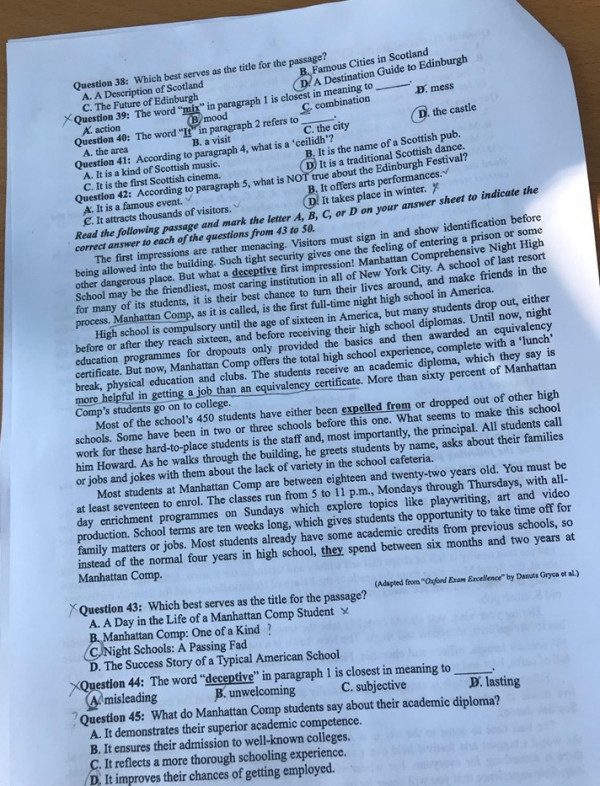
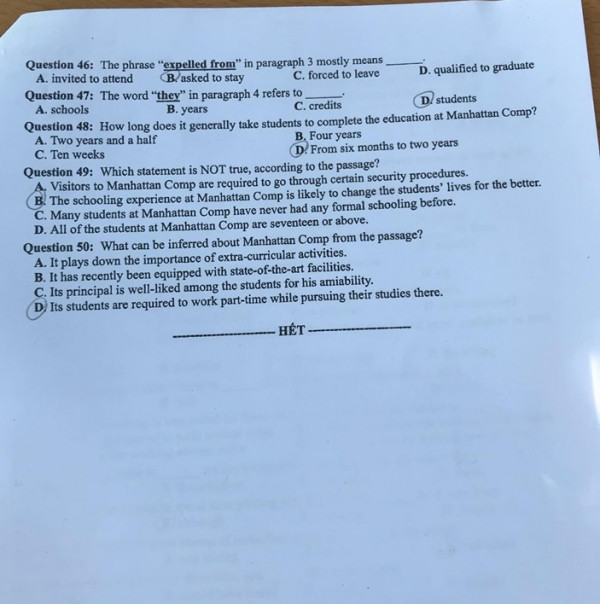
Đáp án Đề thi môn Tiếng Anh THPT Quốc gia 2019 - Mã đề 402
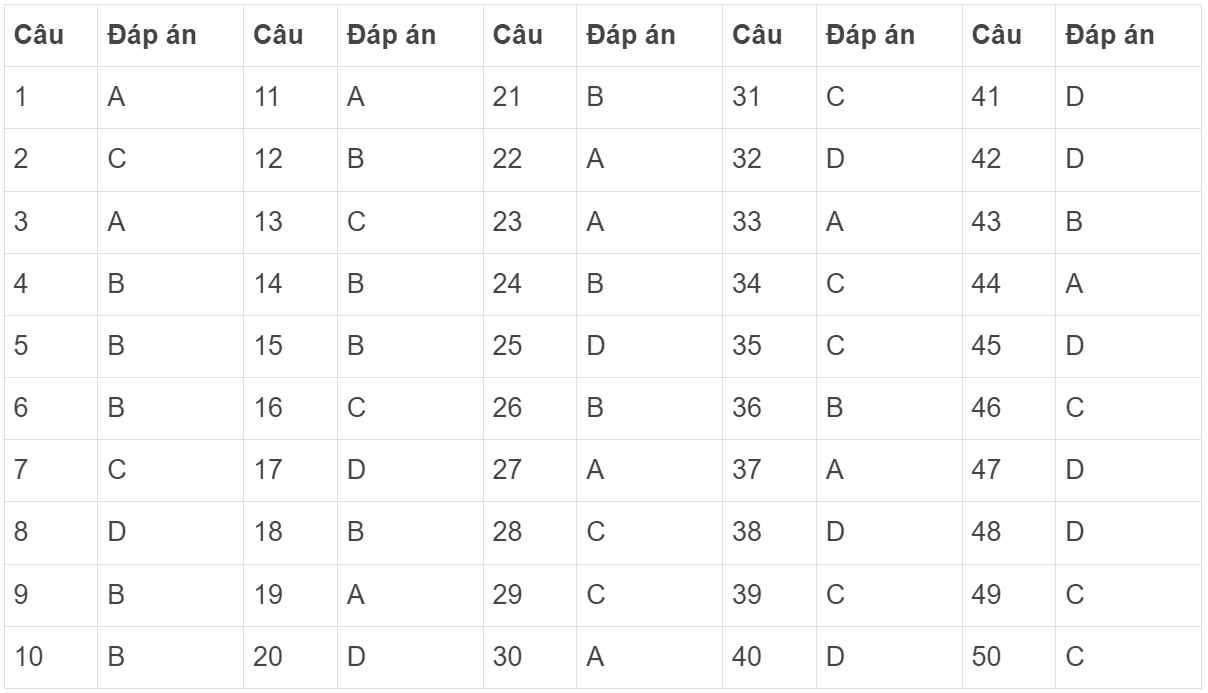
Đề thi môn Tiếng Anh THPT Quốc gia 2019 - Mã đề 403
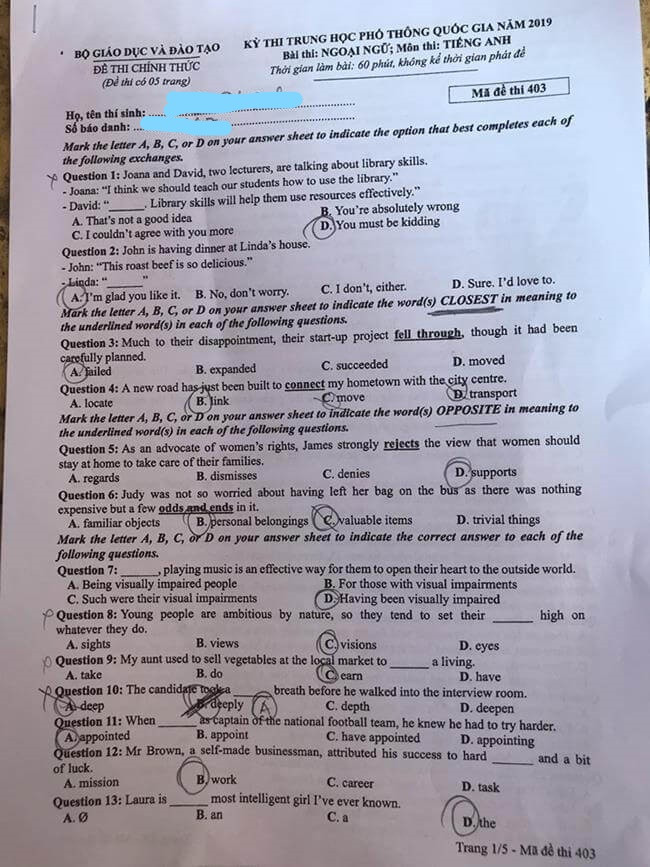
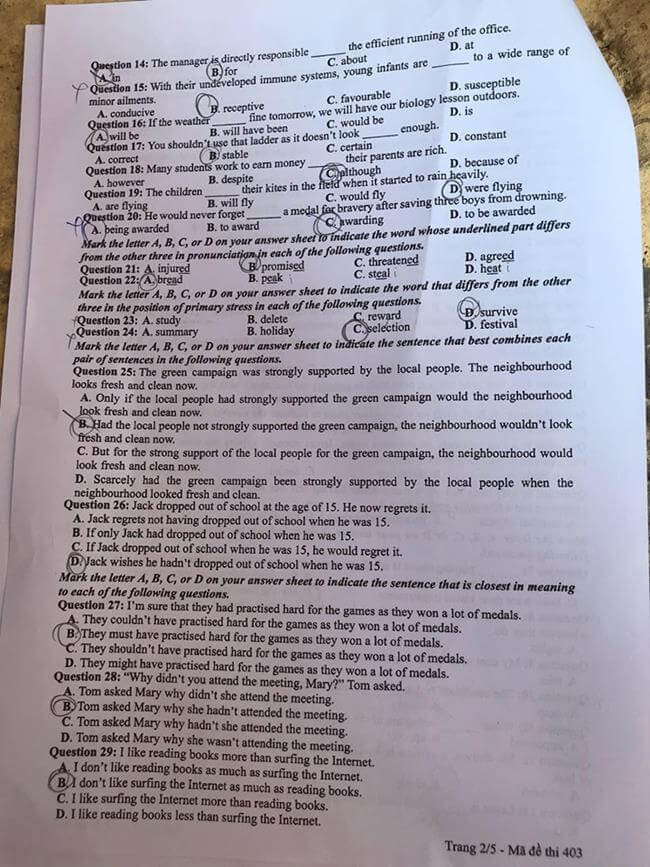
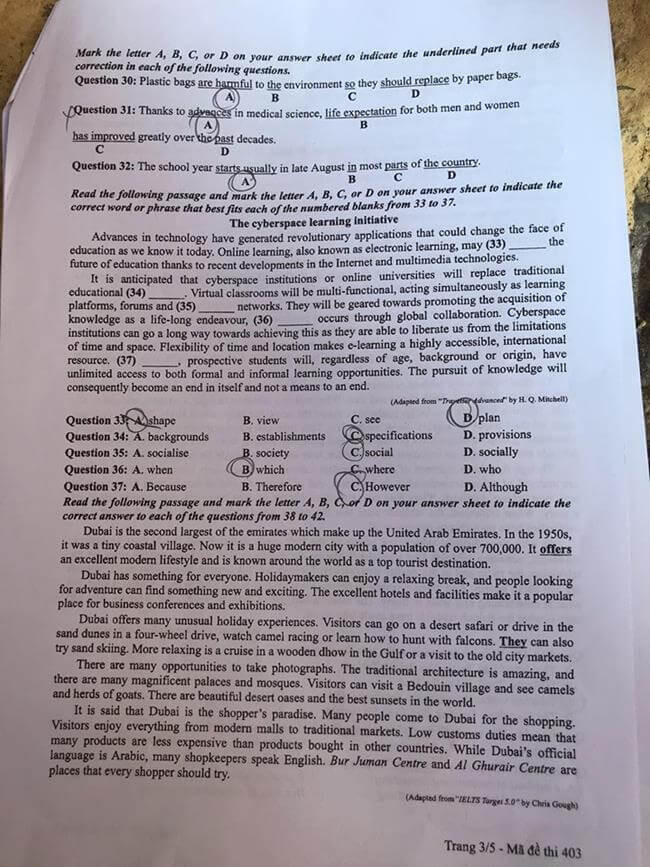
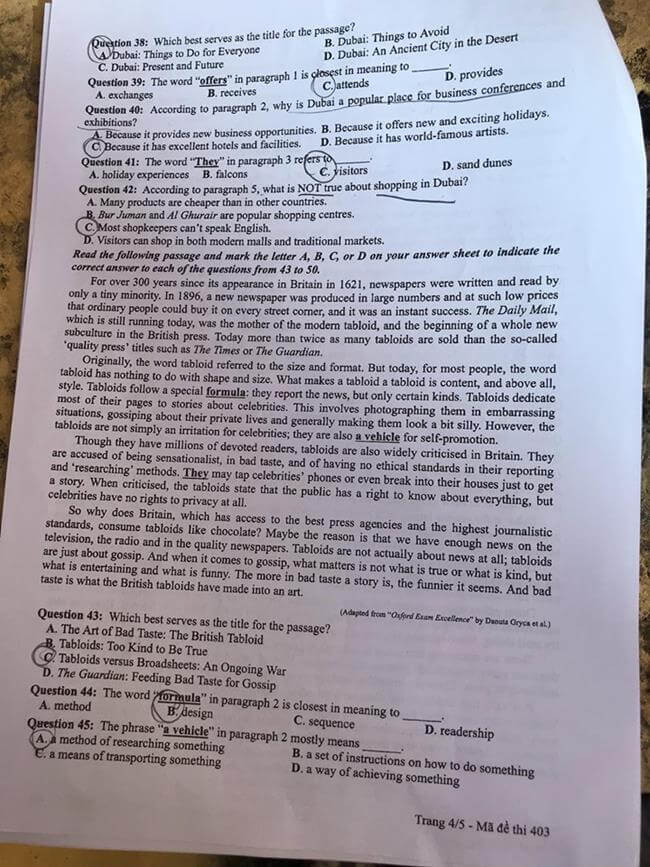
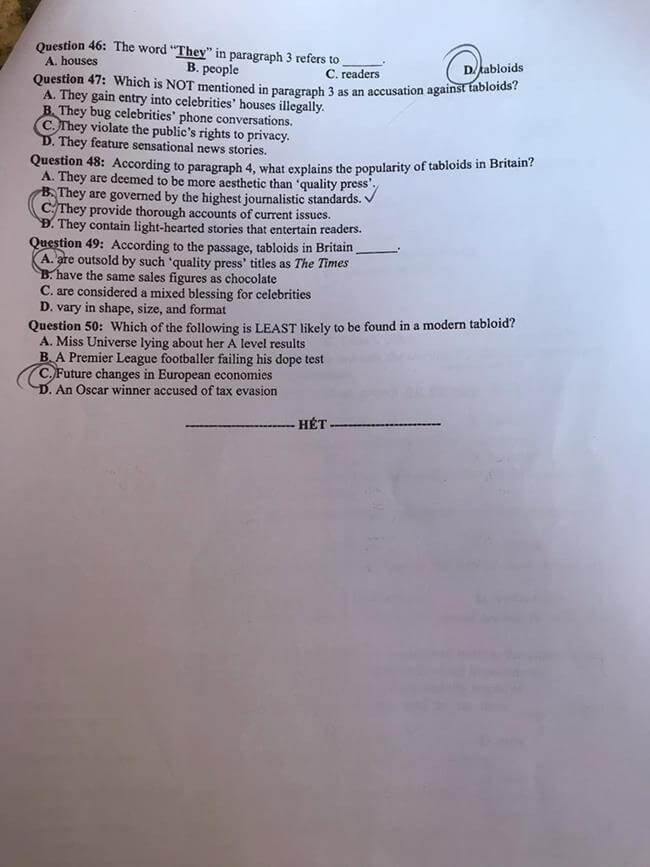
Đáp án Đề thi môn Tiếng Anh THPT Quốc gia 2019 - Mã đề 403
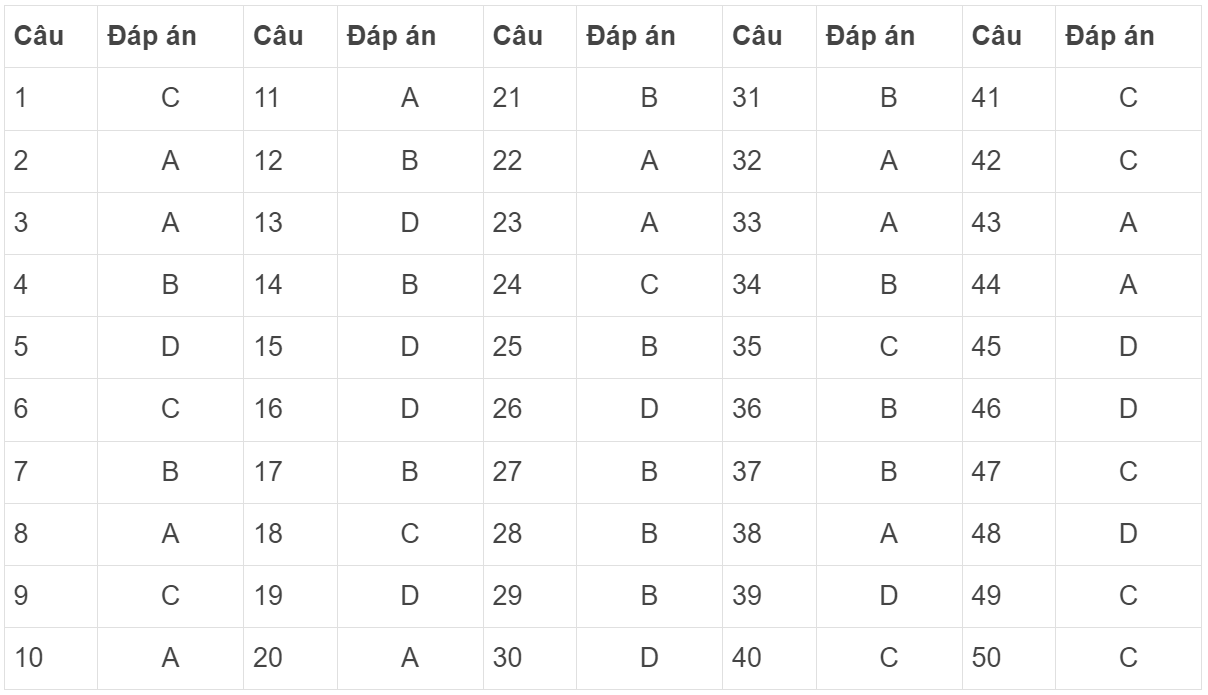
Đề thi môn Tiếng Anh THPT Quốc gia 2019 - Mã đề 404
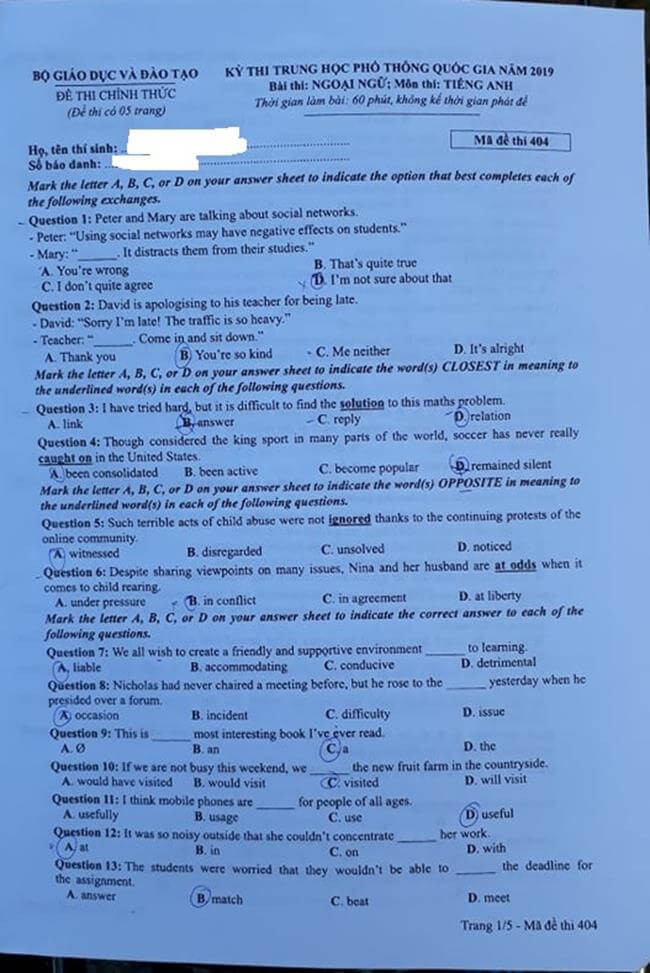
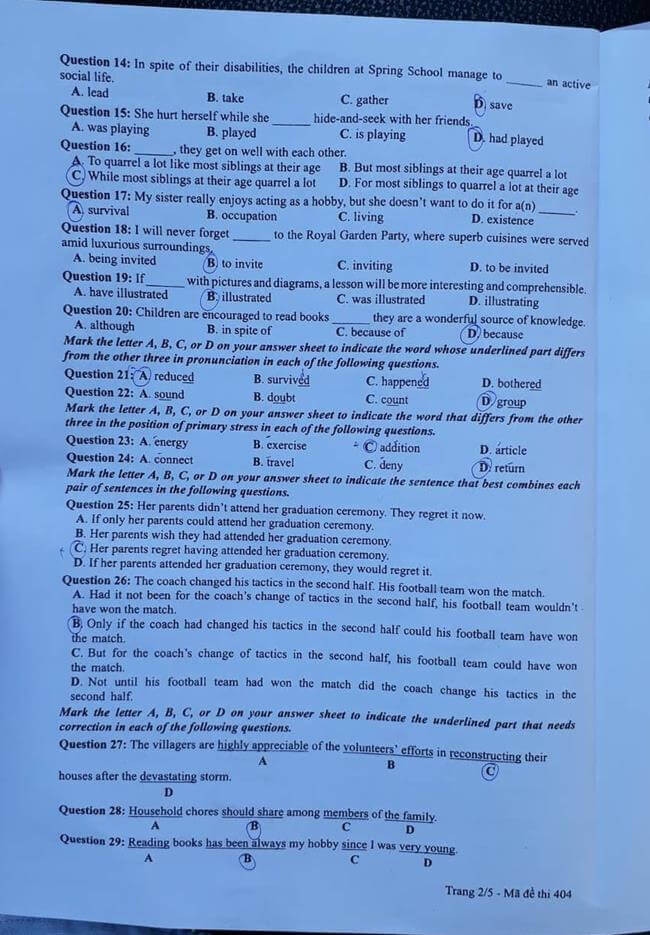
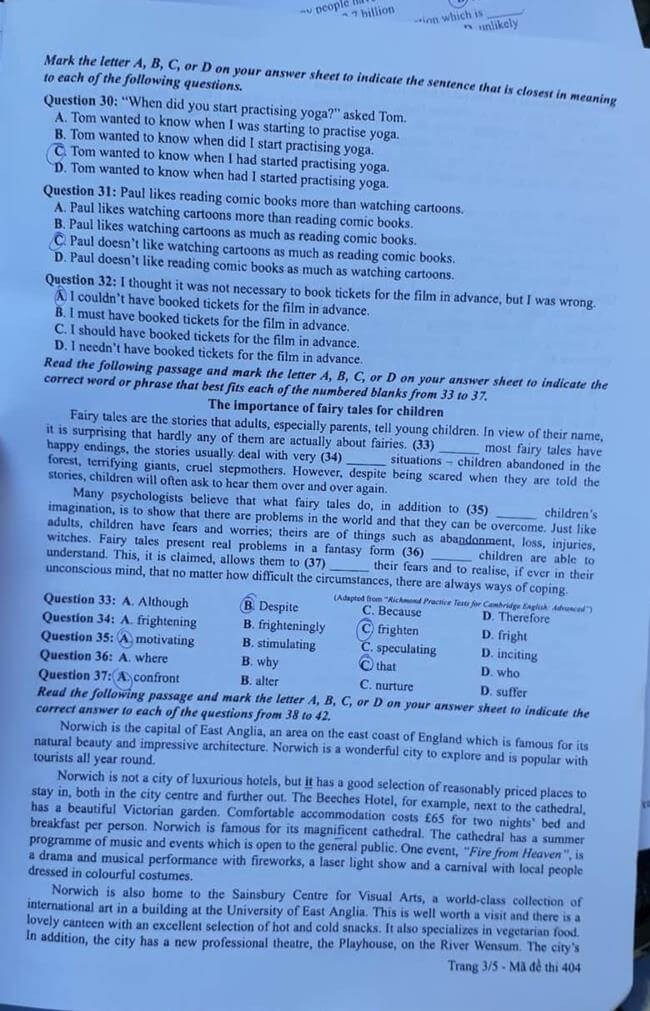
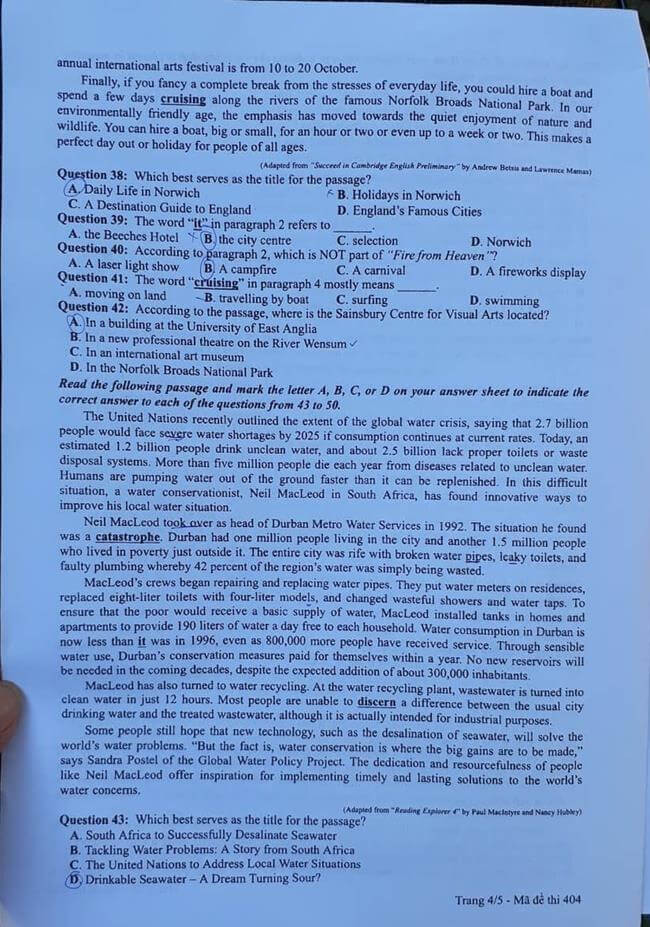
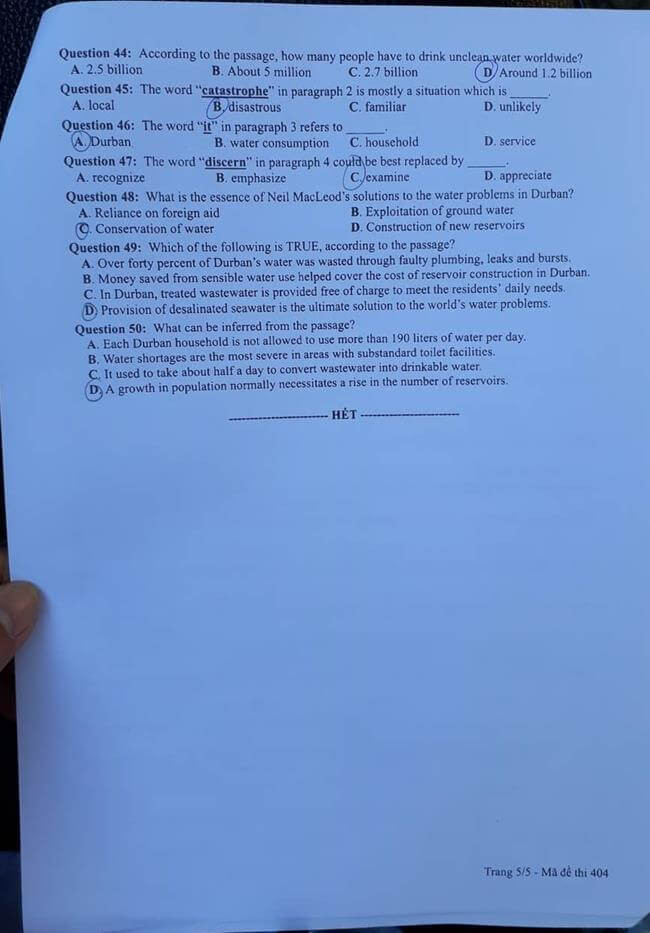
Đáp án Đề thi môn Tiếng Anh THPT Quốc gia 2019 - Mã đề 403
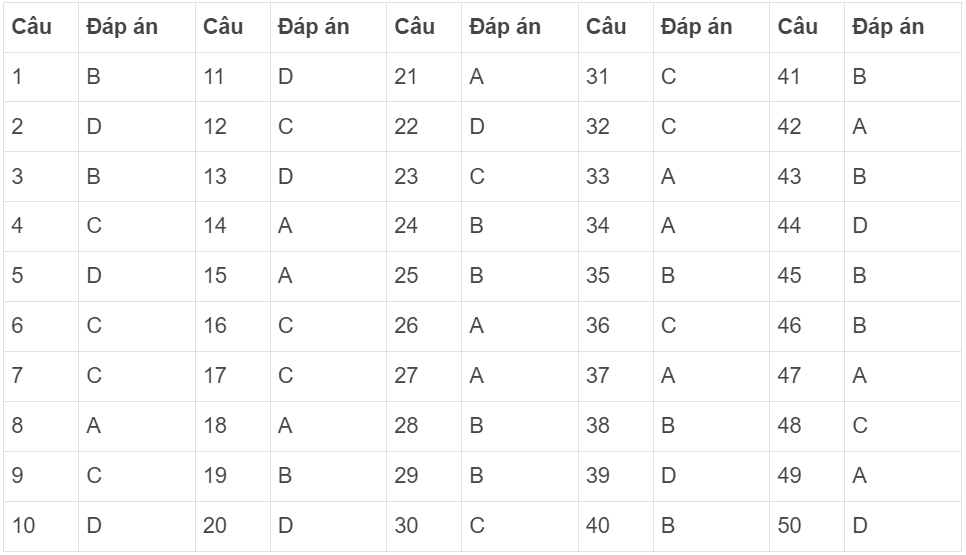
Xem thêm các chương trình khác:
- TOP 100 Đề thi Lịch sử lớp 12 Học kì 1, Học kì 2 năm 2023 - 2024 có đáp án
- TOP 100 Đề thi Vật lí lớp 12 Học kì 1, Học kì 2 năm 2023 - 2024 có đáp án
- TOP 100 Đề thi Giáo dục công dân lớp 12 Học kì 1, Học kì 2 năm 2023 - 2024 có đáp án
- TOP 100 Đề thi Địa lí lớp 12 Học kì 1, Học kì 2 năm 2023 - 2024 có đáp án
